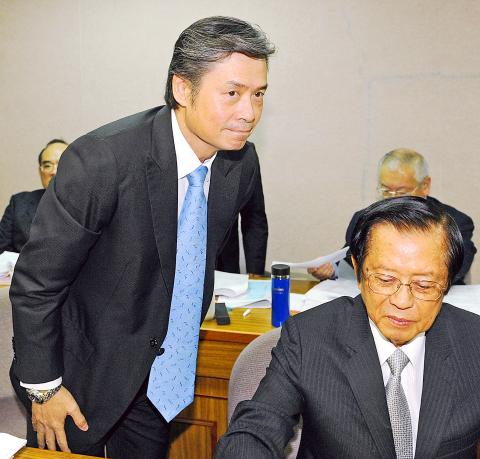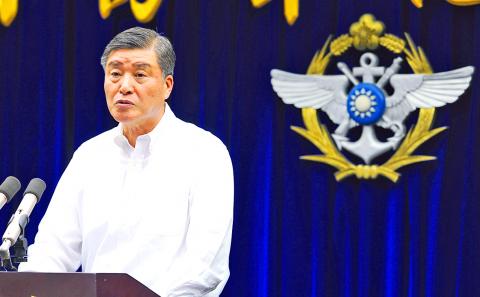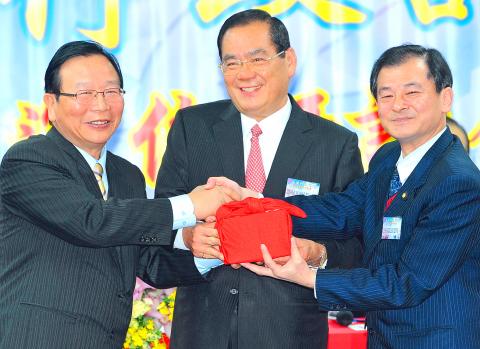The Presidential Office yesterday said it has approved the resignations of National Security Council Secretary-General King Pu-tsung (金溥聰) and Presidential Office Secretary-General Timothy Yang (楊進添), despite President Ma Ying-jeou (馬英九) repeatedly calling for the two officials to remain in their posts.
King is to be succeeded by former minister of national defense Kao Hua-chu (高華柱) and Yang by former deputy legislative speaker Tseng Yung-chuan (曾永權). The new appointments are set to take effect on Thursday next week.
The Presidential Office said that Yang tendered his resignation several days ago on the grounds that his mission had been completed, and, after being asked to remain by the president, resubmitted his resignation citing the need to take care of his elderly mother.

Photo: Chen Chih-chu, Taipei Times
Yang’s second attempt to resign was approved, and, in accordance with precedent, he is to be hired as a senior adviser to the president, the Presidential Office said.
King resigned for “personal health and family reasons” and was also asked not to leave by the president several times, according to the Presidential Office.
King reportedly underwent a coronary artery stenting procedure in October last year.

Photo: Luo Pei-teh, Taipei Times
A source told CNA that King had another heart operation last week, and his family has insisted that he leave his post due to the workload and pressure.
According to a CNA report, King is not expected to work in the near future.
Democratic Progressive Party Legislator Huang Wei-cher (黃偉哲) said he was surprised about the resignations, adding that Kao taking over the national security council was incomprehensible, as he previously resigned from his post as minister of national defense due to health concerns.

Photo: Wang Min-wei, Taipei Times
“The changes to power brought about by the shuffle between King and Kao are not easily understood. We hope that the Presidential Office would disclose more information regarding the arrangement so that the nation can have a clearer idea of what is going on,” Huang said.
Chinese Nationalist Party (KMT) Legislator Lin Yu-fang (林郁方) said King’s resignation also took him by surprise: “I seriously don’t know why [he resigned]; maybe he has other plans for his life.”
Meanwhile, Charles Chen (陳以信), previously deputy commissioner of the KMT's Culture and Communication Committee, is to replace Yin Wei (殷偉) as one of the Presidential Office's spokespersons, with the other being Ma Wei-kuo (馬瑋國). Yin will serve as the president's secretary, in charge of the president's speechwriting team.

LONG FLIGHT: The jets would be flown by US pilots, with Taiwanese copilots in the two-seat F-16D variant to help familiarize them with the aircraft, the source said The US is expected to fly 10 Lockheed Martin F-16C/D Block 70/72 jets to Taiwan over the coming months to fulfill a long-awaited order of 66 aircraft, a defense official said yesterday. Word that the first batch of the jets would be delivered soon was welcome news to Taiwan, which has become concerned about delays in the delivery of US arms amid rising military tensions with China. Speaking on condition of anonymity, the official said the initial tranche of the nation’s F-16s are rolling off assembly lines in the US and would be flown under their own power to Taiwan by way

‘OF COURSE A COUNTRY’: The president outlined that Taiwan has all the necessary features of a nation, including citizens, land, government and sovereignty President William Lai (賴清德) discussed the meaning of “nation” during a speech in New Taipei City last night, emphasizing that Taiwan is a country as he condemned China’s misinterpretation of UN Resolution 2758. The speech was the first in a series of 10 that Lai is scheduled to give across Taiwan. It is the responsibility of Taiwanese citizens to stand united to defend their national sovereignty, democracy, liberty, way of life and the future of the next generation, Lai said. This is the most important legacy the people of this era could pass on to future generations, he said. Lai went on to discuss

MISSION: The Indo-Pacific region is ‘the priority theater,’ where the task of deterrence extends across the entire region, including Taiwan, the US Pacific Fleet commander said The US Navy’s “mission of deterrence” in the Indo-Pacific theater applies to Taiwan, Pacific Fleet Commander Admiral Stephen Koehler told the South China Sea Conference on Tuesday. The conference, organized by the Center for Strategic and International Studies (CSIS), is an international platform for senior officials and experts from countries with security interests in the region. “The Pacific Fleet’s mission is to deter aggression across the Western Pacific, together with our allies and partners, and to prevail in combat if necessary, Koehler said in the event’s keynote speech. “That mission of deterrence applies regionwide — including the South China Sea and Taiwan,” he

UNPRECEDENTED: In addition to the approved recall motions, cases such as Ma Wen-chun’s in Nantou are still under review, while others lack enough signatures The Central Election Commission (CEC) announced yesterday that a recall vote would take place on July 26, after it approved the first batch of recall motions targeting 24 Chinese Nationalist Party (KMT) lawmakers and Hsinchu Mayor Ann Kao (高虹安). Taiwan is in the midst of an unprecedented wave of mass recall campaigns, following a civil society push that echoed a call made by Democratic Progressive Party (DPP) caucus whip Ker Chien-ming (柯建銘) in January to initiate signature drives aimed at unseating KMT legislators. Under the Civil Servants Election and Recall Act (公職人員選舉罷免法), Taiwanese can initiate a recall of district-elected lawmakers by collecting